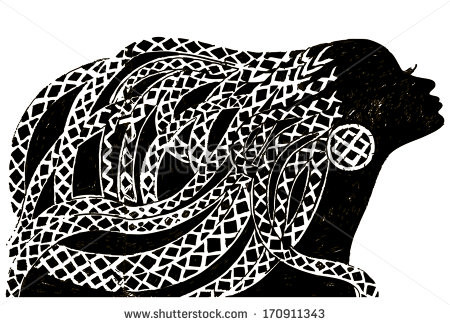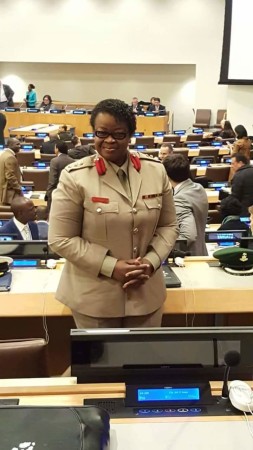Category: Uncategorized
Art + Feminism _ Wiki Loves Women Edit-a-thon
Art + Feminism _ Wiki Loves Women Edit-a-thon
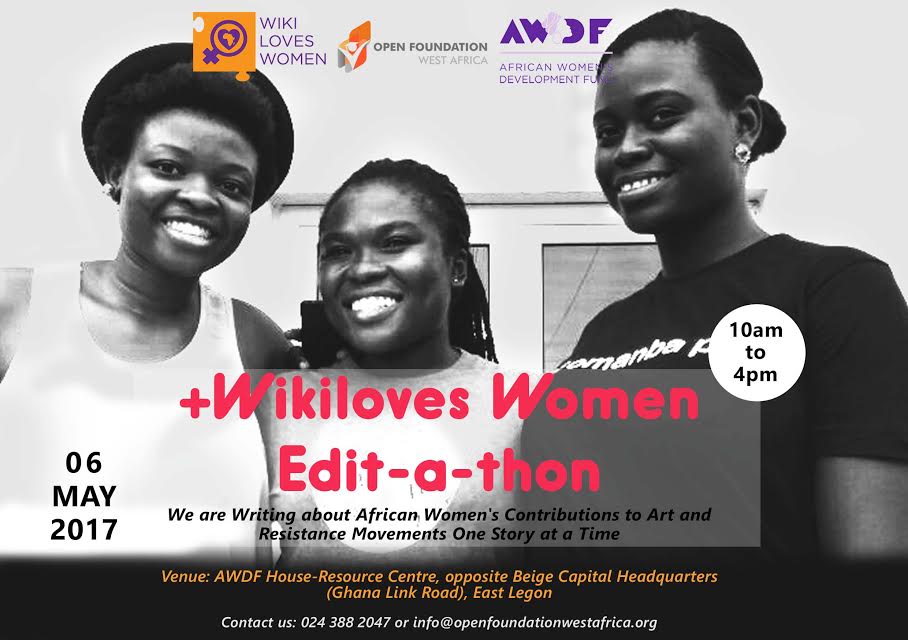
HIV/AIDS AND STIGMATIZATION: THE FIGHT OF THE ATFS
HIV/AIDS AND STIGMATIZATION: THE FIGHT OF THE ATFS
[tp lang=”en” not_in=”fr”]
The African Women’s Development Fund (AWDF) actively supports organisations working for prevention and control of HIV/AIDS in Africa. As such, AWDF provided a grant to the Association Togolaise “Femmes et Sida” (ATFS) to finance its economic empowerment project of women and young girls living with HIV/AIDS and also organise an anti-stigmatization campaign in the district of Agoè, Lomé, Togo.
In Togo as in lots of places, despite many years of fighting HIV/AIDS, the disease continues to spread and cause havoc, which is a hindrance to the country’s development. Because of inadequate access to health-care and lack of awareness on prevention, HIV/AIDS is a serious threat to public health, and also causes the discrimination, stigmatization, refusal of medical care or even the right to have a family, professional and social exclusion of affected people. It is more obvious that challenges to this scourge still persist.
With this background, the ATFS has chosen to focus on two main objectives: the awareness and the education of the community to reduce stigmatization and discrimination of people living with HIV/AIDS and also the reduction of the socio-economic impact of HIV/AIDS on women who are living with it.
Thus, thanks to AWDF and the close cooperation of other local partners, an important campaign of awareness has been established by the ATFS. The creation of posters, prospectus and radio campaigns against the stigmatization of people living with HIV/AIDS and also direct discussions with the community have helped to decrease the discrimination of people who are affected by the disease.
Furthermore, in an effort to strengthen the empowerment of people who are affected, the ATFS selected thirty women and young girls living with HIV/AIDS in a precarious situation. These women took advantage of a learning experience and micro-credits which gave them access to the management of an income-generating activity.
Concretely, at the end of this project, it must be noted that there is a better fulfillment of women living with HIV/AIDS. Because of the opportunity to manage an income-generating activity, the status of women has improved. As a result of this, husbands give more regard and respect to their wives since they are now able to provide for their basic family needs. For example, thanks to this help, one of beneficiaries has been able to pay the health-care of her sick son.
Furthermore, within the community, a real change in mentality took place in the district of Agoè. As a result of the decline of stigmatization and discrimination of people living with HIV/AIDS, life for affected women is better. The community has realized their human value and their rights which makes them more confident. One of beneficiaries has stated that: “we’re going out of a situation of fear knowing that there are some struggles for our legal, social and economic protection”.
Finally, even if there are some laws and policies aimed at combating the spread of HIV/AIDS, actions like this one are essential. To illustrate, after a meeting with the community during the prevention campaign, a man said that: “Ladies, this is gold that you are giving to us and this is human lives that you are saving”.
The great public mobilization and the beneficiaries’ goodwill have helped to realize significant improvements, both in terms of awareness of the community and improvement of the quality of the lives women living with HIV/AIDS.
However, the fight is not over, it must be continued and scaled up to improve the lives of the entire population of people living with HIV/AIDS.
[/tp]
[tp lang=”fr” not_in=”en”]
SIDA ET STIGMATISATION : LE COMBAT DE L’ATFS
Le Fonds Africain pour le Développement de la Femme (AWDF) soutient activement des organisations œuvrant pour la prévention et la lutte contre le VIH / SIDA auprès des populations africaines. A ce titre, l’AWDF a octroyé une subvention à l’Association Togolaise “Femmes et Sida” (ATFS) afin de financer son projet d’autonomisation économique des femmes et jeunes filles vivant avec le VIH/SIDA ainsi que l’organisation d’une campagne anti-stigmatisation dans le canton d’Agoè à Lomé au Togo.
Au Togo comme dans de nombreux endroits, malgré des années de lutte contre le VIH/SIDA, la maladie continue de se propager et de causer des ravages, freinant ainsi le développement du pays. Du fait d’un mauvais accès aux soins et d’un manque de prévention, le VIH/SIDA est un véritable problème de santé public qui entraine également la discrimination, la stigmatisation, le refus de soins médicaux ou encore l’exclusion familiale, professionnelle et sociale des personnes touchées. Force est de constater que les défis à relever face à ce fléau restent importants.
Dans ce contexte, l’ATFS a choisi de mettre l’accent sur deux points essentiels : la sensibilisation et l’éducation de la communauté en vue de faire reculer la stigmatisation et la discrimination des personnes vivant avec le VIH/SIDA ainsi que la réduction de l’impact socio-économique du VIH/SIDA sur les femmes vivant avec le virus.
Ainsi, grâce à l’AWDF et en étroite collaboration avec de nombreux partenaires locaux, une importante campagne de sensibilisation a été mise en place par l’ATFS. La création d’affiches, de prospectus et de campagnes radio contre la stigmatisation des personnes vivant avec le VIH/SIDA mais aussi des discussions directes avec la communauté ont permis de freiner la discrimination des personnes touchées par la maladie. De plus, dans une volonté de renforcer l’autonomisation des personnes atteintes, l’ATFS a sélectionné trente femmes et jeunes filles vivant avec le VIH/SIDA et en situation précaire afin de leur faire bénéficier d’une formation et de micro-crédits leur permettant d’accéder à la gestion d’une activité génératrice de revenus.
Concrètement, à l’issu de ce projet, on note un meilleur épanouissement des femmes vivant avec le VIH/SIDA. Ayant pu accéder à des activités génératrices de revenus, la condition des femmes se trouve améliorée notamment parce que leur époux les prennent d’avantage en considération, celles-ci pouvant subvenir aux besoins élémentaires de leur famille. A titre d’exemple, grâce à cet appui, une des bénéficiaires a pu économiser suffisamment pour faire soigner son fils souffrant.
De plus, au sein de la communauté, un véritable changement de mentalité s’est opéré dans le canton d’Agoè. Du fait du recul de la stigmatisation et de la discrimination des personnes vivant avec le VIH/SIDA, le quotidien des femmes touchées est meilleur. La communauté se rend davantage compte de leurs valeurs humaines et de leurs droits ce qui permet à ces femmes de reprendre confiance en elles. L’une des bénéficiaires a d’ailleurs affirmé : “nous sortons d’une situation de peur sachant que des luttes se mènent pour notre protection juridique, sociale et économique”.
Finalement, même si certaines lois et politiques visent bel et bien à lutter contre la propagation du VIH/SIDA, des actions comme celles réalisées par l’ATFS avec l’appui de l’AWDF apparaissent plus qu’essentielles, elles sont indispensables. Pour illustration, à la suite d’une rencontre avec la population dans le cadre de la campagne de prévention, un homme a déclaré : “Mesdames, c’est de l’or que vous nous donnez et c’est des vies humaines que vous sauvez”.
La grande mobilisation du public et la bonne volonté des bénéficiaires ont permis de réaliser des avancées notables, aussi bien en termes de prévention et de sensibilisation auprès de la communauté qu’en termes d’amélioration de la qualité de vie des femmes et jeunes filles atteintes du VIH/SIDA.
Toutefois, le combat n’est pas terminé, il doit être poursuivi et intensifié afin d’améliorer le quotidien d’une part plus importante de la population.
[/tp]
VIDEO CONFERENCING FACILITIES
VIDEO CONFERENCING FACILITIES
ARE YOU IN NEED OF A STATE OF THE ART VIDEO CONFERENCING FACILITY WITH SUPERIOR AUDIOVISUAL FEATURES?
ARE YOU LOOKING TO EXPAND YOUR BUSINESS, GAIN NEW CLIENTS AND PARTNERS, AND INTERACT WITH PEOPLE ALL OVER THE WORLD?
DO YOU NEED A PEACEFUL AND QUIET ENVIRONMENT, A SPACE WHERE YOU HAVE BUSINESS CONFIDENTIALITY AND HIGH QUALITY SERVICE?
LOOK NO FURTHER. AWDF HAS ONE OF THE FINEST VIDEO CONFERENCING FACILITIES TO OFFER IN GHANA. SCHEDULE YOUR NEXT VIDEO CONFERENCING SESSION WITH US! WE ACCEPT WALK-INS, MONDAY – FRIDAY 9AM – 5PM.
CALL TO FIND OUT MORE ABOUT OUR AFFORDABLE PRICES!
0289669666 / 0242700881
Job Vacancy : Administrative Assistant
Job Vacancy : Administrative Assistant
AFRICAN WOMEN’S DEVELOPMENT FUND
JOB VACANCY : ADMINISTRATIVE ASSISTANT
Background
The African Women’s Development Fund (AWDF) is a grant making foundation, which aims to support the work of the African women’s movement for peace, equality, sustainable development and social justice. AWDF, which is based in Accra, Ghana, requires the services of an astute, experienced, innovative, dedicated and dependable Administrative Assistant. Priority shall be given to female applicants.
Scope
Her responsibility shall be to assist the Human Resource Manager in providing administrative and HR services to the organisation to ensuring that AWDF’s operations are executed in an effective, accurate and up to date manner.
Responsibilities:
- Keep the Front desk of the organization
- Ensure effective and efficient receipt of incoming letters and documents distribution (and filling of documents where appropriate) as well outgoing ones;
- Assist in resolving administrative problems by coordinating logistical complaints: receive, record and invite the relevant service provider to fix the problem
- Assist in ensuring operation of equipment by completing preventive maintenance requirements; calling for repairs; maintaining equipment inventories; evaluating new equipment and techniques.
- Assist in maintaining supplies inventory by checking stock to determine inventory level; anticipating needed supplies; placing and expediting orders for supplies; verifying receipt of supplies.
- Assist in procurement processes according to the organisation’s procurement policy
- Assist in maintaining electronic and hard copy filing system
- Assist in maintaining confidential records and files
- Take minutes at meetings and distribute them 7 days after the meeting
- Provide professional administrative support to supervisor during recruitment process – collate soft and hard copies of applications received; communicate interview schedules, etc.
- Assist in coordinating logistical arrangements both in-house and external events according to laid down procedures (flight bookings, accommodation, venue, for board meetings; Organise information / board papers other organisational meetings.
- Assist in ordering and maintaining stationery and equipment supplies (checking quotations, wait for approval before purchases are made)
- Assist in the renewal of permits , NGO recognition certificate and Filling of annual returns
- Any other duties as may be assigned by the line manager
Person Specification
- Bachelor degree in HR/ Administration or its equivalents required
- Minimum of 2 years of hands on administrative support experience
- Proficiency in MS Word, MS Excel and MS Outlook a must
- Knowledge of office administration and reasonable knowledge of Human Resource management
- Knowledge of operating standard office equipment
Competencies required:
- Must have excellent communication (oral and written ) and listening skills
- Ability to speak and interact clearly and professionally
- Ability to prioritise work and strong problem solving skills
- Good research skills and attention to detail
- Ability to work methodically, accurately, timely and neatly
- Must be a team player with excellent inter personal skills
- Experienced working with an international organisation and has cultural awareness (preferred)
- Has good analytical skills
- Extremely organised. Strong multi-tasking and time-management skills.
- Can handle sensitive information with the highest degree of integrity and confidentiality.
- Knowledge in ticketing is a plus.
- Ability to work on one’s own with minimum supervision.
Qualified candidates should send typewritten applications and a CV of not more than 3 pages to the Human Resource Manager, African Women’s Development Fund (AWDF), 78 Ambassadorial Enclave, East Legon, P.M.B.CT 89, and Cantonments Accra Ghana. Copies should be sent by email to grace@africlub.net/awdf, with ‘Administrative Assistant’ as the subject reference. Applications should reach AWDF no later than June 10, 2016.
Only short listed candidates will be contacted for additional information and interviews.
From the Archives: TEDxChange : We need the Voices of African Women
From the Archives: TEDxChange : We need the Voices of African Women
The United Nations theme for International Women’s day 2016 is “Achieving Gender Parity.” On a continent with as many boundaries for women as Africa, this still seems a far away reality. Although we have done amazing work in pushing forward the agenda of women in the past 15 there is undoubtedly a long way to go. Development of the African continent needs to be driven by women and men–and it is important to bring women’s voices to every table, every conference and every conversation. Women have made major change on this continent. And this International Women’s day we celebrate their achievements and their struggles, as we echo the sentiments that we need to carry with us in our work.
Many of the points mentioned in this The TED Talk below, given in 2012, are as important today as they were when AWDF CEO Theo Sowa first spoke on them. There is still a desperate need to have a larger number of African women at the table, where they can shape “our story.”
International Women’s Month The Interviews Part 2
International Women’s Month The Interviews Part 2
Sex On College Campuses – Are Women More Than A Function?
By Maame Akua Marfo
“There are two types of relationships on campus– there’s the hook up kind which, maybe the boy has a lot of friends and then he starts to sleep with some of them. and then there’s another kind which is like a long one night stand.” – M
Relationships seem to find themselves on a sliding scale, from those preparing themselves for marriage to those that revolve around having multiple partners at one time but very rarely do these relationships turn out well for the women involved. The attitude to sex is casual, ranging from relationships that are considered “marriage like” but still involve other partners, to those that solely involve random hook ups.
For many of the women in the room it has always been clear that on campus women do not get to enjoy the same sort of sexual freedom without being reprimanded. For them there is a strange mixture of being encouraged to play the role of the “bad girl” on social media and everyone pretending to be okay with something with one breath but in the next taking a different position. For young men on campus however, sex is a game of divide and conquer. The students in the room describe a “the more the merrier” attitude and though sex itself is encouraged, women are often looked down upon for having more than one partner and the damage that open knowledge of a woman’s sexual partners can do is irreparable. It seems nearly impossible for a woman to be able to please both her boyfriend, herself, and the society around them.
“Some boys– only contact you when the semester is about to start because that’s when you’re conveniently accessible to them… Sometimes I feel like people look at girls on campus as commodities. It’s not just a singular problem. It’s about the way you view women in general. Because if you actually had respect for them as people you wouldn’t look at them as…disposable. People aren’t interchangeable like that.” -A
The relationships between students is far more complex than most would presume them to be. At a glance– relationships seem simple. Women are expected to play the role of the whore, the mother and the friend and in an age that boasts open mindedness about sex, it seems the open mindedness only applies to one gender. This puts women in precarious positions and contributes greatly to a culture that is unaccepting of womanhood in its totality. Women’s reputations are both armour and weapon depending on who is using them and their consistent subjugation and understanding of who they are always relates back to the men they are dating, sleeping with, or seen talking to.
How often do they understand themselves–for themselves? How often do men see them as more than a function? Are they more than just laundromats, cooks, wives and “whores”? This inability to see women as people in their entirety makes them easier to dismiss, easier to shrink and ultimately– easier to abuse. And on a college campus where students are learning how to relate to each other, and how to manage power in relationships, this places them in a dangerous position. It becomes easy to turn people– with their layers and unique individuality into little more than functions.
To Be Contd
The Interviews: Setting the Stage
The Interviews: Setting the Stage
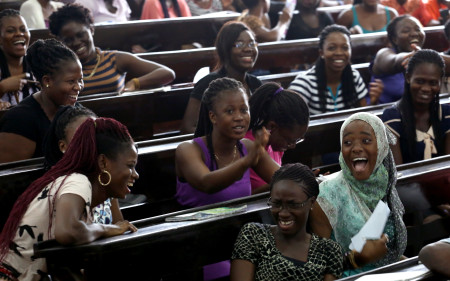
By Maame Akua Marfo
In an empty classroom on the University Of Ghana’s Legon Campus, eight students are talking.
It’s the kind of exchange one would expect on what is arguably the nation’s premier university, but the topic is far from their daily classroom discussions. The topic is their life.
For International Women’s day this year the African Women’s Development fund is hosting a panel conversation focusing on sex and relationships and the concept of date rape on local university campuses. The topic is one that has been discussed at length both domestically and internationally. The Ghanaian public are already aware of just how brutal university campuses can be for young women – from the stripping of a suspected thief in Commonwealth hall, to the leaking of various sex tapes and private pictures, young women are often victimized in these spaces.
But from the outside it’s often hard to paint a real picture.
So before the discussion we gathered a group of young women and a few men to see what the landscape of their campus is to them– and how date rape, sexual abuse and gender-based violence find their way into what are presumed to be hallowed halls.
Over the course of the first hour it becomes clear that the students talking are reflective– a far cry from the apathetic trope tossed around when students are discussed. They care deeply, especially about this. They open up about their relationships – and the ones that happen around them, with a surprising ease.
“We were in class and the professor asked a question about how we think women should dress going to church. And this guy pipes up and starts talking about how as women when you go to church you have to dress well to attract the right kind of attention…you know? You’re looking for a husband and you don’t want to attract the wrong sort of man. Most of the girls in the class were offended. I mean what do you mean? Ghanaian girls everywhere we go we are looking for a husband. In a club. In church. In school. Everywhere,” N, a final year student, said.
To N there seemed to be a strange draw for long-term relationships which many girls presumed would lead to marriage, and there was a trend where a lot of the girls seemed to date older men. A few comments from the male participants made it clear that there were times when this was true on their end too. They described relationships were their fellow students would have a decisive say in the ways their girlfriends dressed and the way they did their hair– and the girls in turn would have a list of things they didn’t want their boyfriend to do– though it seemed the first list was more restrictive.
This need for long term relationships that mirror marriage can set a dangerous precedent. The large amount of pressure placed on these young women makes them susceptible to making choices that go against their best interest just to fit in better. It also makes them more likely to accept undesirable behavior from their spouses because catering to them becomes more than just a suggestion; it becomes a necessity.
One thing is clear however, these relationships aren’t the only kind on campus. There’s a hook up culture here too, though it’s often hidden to avoid public shame (for women). Men however seem to be encouraged to have multiple relationships with multiple girls.
To be continued
International Women’s Day 2016 – Breaking The Brass Ceiling In Ghana’s Armed Forces
International Women’s Day 2016 – Breaking The Brass Ceiling In Ghana’s Armed Forces
Right in time for International Women’s Day this year we are thrilled to hear about Ghanaian Col. Constance Edjeani-Afenu’s promotion to the rank of Brig. General. It is the first time in the history of the Ghana Armed Forces that a woman has attained this rank.
Edjeani-Afenu, the Deputy Military Adviser of the Permanent Mission of Ghana to the United Nations in New York, now joins Africa’s tiny handful of elite ranking female officers.
This is a huge step forward for women in Ghana and shows how far we have come in such a male-dominated sector. We celebrate her achievement.
At AWDF we support changemakers – women’s activist organizations and individuals who defend and advance women’s empowerment, voice and rights. The Nimbus Foundation is an example of one such group. An $8,000 dlr grant from AWDF in 2015 enabled the Foundation to train 100 police officers to effectively handle cases of reported abuse. The police, selected from the Greater Accra region, were provided with a better understanding rights of the vulnerable, how to reduce rights violation by security officers. The officers; training was completed last month.
In 2001 Squadron Leader (Sqn Ldr) Selase Agbenyefia graduated as Ghana’s first female military helicopter pilot. She is also the first female helicopter pilot who flew with the Ghana Aviation Unit of the United Nations Peacekeeping Mission in Cote d’Ivoire UNOCI. More recently in August 2015, Col Felicia Twum-Barima was appointed Director of the Education Corps for the Ghana Armed Forces, another first.
Turning to a completely different subject, AWDF will investigate Violence Against Women, Sexuality and Relationships on university campuses in Ghana, with a special emphasis on Date Rape and Sexual Assault. Read here our in-depth interviews with students on the University of Ghana as they open up about real-life relationships on campus.
For International Women’s Day we also salute women whose innovative and heroic interventions proved timely and life-saving during West Africa’s Ebola epidemic which raged from March 2014 to September 2015. Read how Sierra Leone’s Media Matters For Women made that crucial difference here.
World Health Organization Declares Ebola Outbreak Over In West Africa
World Health Organization Declares Ebola Outbreak Over In West Africa
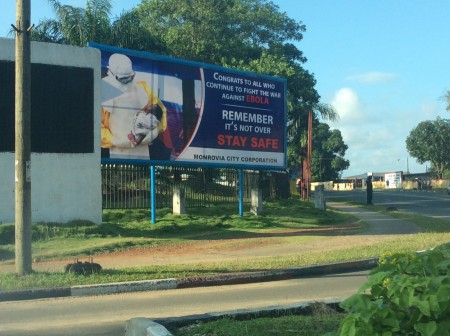
January 14, 2016 – Today, the World Health Organization (WHO), declared the end of the most recent outbreak of Ebola virus disease in Liberia and says all known chains of transmission have been stopped in West Africa.
It’s a day to celebrate, yet the consequences of this outbreak – the worst the world has ever known, are devastating: over 11,000 deaths out of 28,000 infections in Liberia, Sierra Leone and Guinea, the three worst affected countries, and economies and lives shattered.
Liberia was first declared free of Ebola transmission in May 2015, but the virus was re-introduced twice since then, with the latest flare-up in November. The last confirmed patient in Liberia has tested negative for the disease following two consecutive 21 day incubation cycles of the disease.
“More flare-ups are expected and that strong surveillance and response systems will be critical in the months to come,” WHO said in a statement.
For us at AWDF who have been deeply involved with assisting women’s groups from the start of the epidemic, the welfare of women must continue to be a priority for local, government and regional leaders. The critical support which will be needed to get families back on their feet, children in school and health systems running, must not be denied.
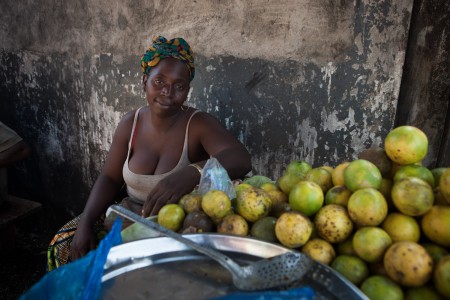
“We need support for the women affected by Ebola and those involved in the fight,” says Djakagbe Kaba, who heads the Association Guineenne pour L’Allegement des Charges (AGACFEM), an AWDF grantee which was instrumental in coordinating Ebola prevention and education efforts in Kissidougou, one of the worst affected areas.
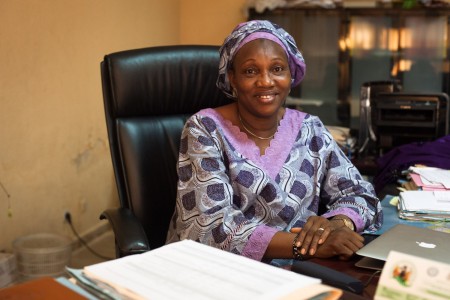
“After Ebola I hope we can help women resume their work in soap-making and agricultural production. Though the epidemic has passed, we must still be observant and remind people to always wash their hands. Preventive measures must continue,” Kaba said.
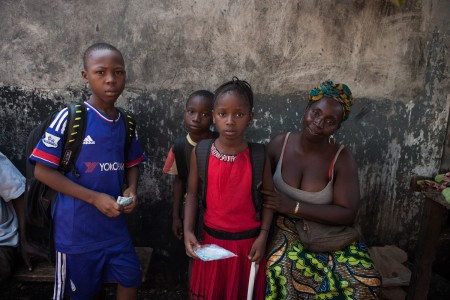
All our efforts will be needed in the months to come to ensure that the necessary prevention, surveillance and response capacity across all three countries are put in place and that more women are ready to shoulder responsibility in these efforts. Please make a donation now.


